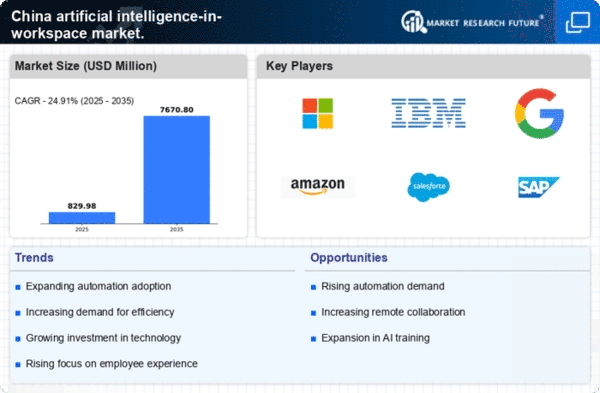Rising Demand for Efficiency
The artificial intelligence-in-workspace market in China is experiencing a notable surge in demand for efficiency across various sectors. Organizations are increasingly adopting AI technologies to streamline operations, reduce costs, and enhance productivity. According to recent data, companies that implement AI solutions report an average productivity increase of 20-30%. This trend is particularly evident in manufacturing and service industries, where AI-driven automation tools are utilized to optimize workflows. As businesses strive to remain competitive, the integration of AI into daily operations is becoming essential. The push for efficiency not only drives the adoption of AI technologies but also fosters innovation within the artificial intelligence-in-workspace market. Firms seek to leverage advanced analytics and machine learning capabilities.
Government Initiatives and Support
The Chinese government plays a pivotal role in the growth of the artificial intelligence-in-workspace market through various initiatives and support programs. Policies aimed at promoting AI research and development are being implemented, with significant funding allocated to AI startups and established companies. The government has set ambitious goals to position China as a leader in AI by 2030, which includes enhancing the integration of AI in workplaces. This strategic focus is expected to boost the market, as public and private sectors collaborate to develop AI solutions tailored to local needs. Furthermore, the government's commitment to fostering a favorable regulatory environment encourages investment in AI technologies, thereby accelerating the growth of the artificial intelligence-in-workspace market.
Growing Need for Enhanced Collaboration
The artificial intelligence-in-workspace market is being propelled by a growing need for enhanced collaboration among teams and departments within organizations. AI tools that facilitate communication and collaboration are becoming essential as businesses adapt to more dynamic work environments. Solutions such as AI-driven project management software and virtual collaboration platforms are gaining traction, enabling teams to work more effectively regardless of their physical location. This trend is particularly relevant in the context of remote work, where AI technologies help bridge communication gaps and foster teamwork. As organizations increasingly prioritize collaboration, the demand for AI solutions that support these efforts is expected to rise, further driving the growth of the artificial intelligence-in-workspace market.
Increased Investment in AI Technologies
Investment in artificial intelligence technologies is witnessing a remarkable increase in China, significantly impacting the artificial intelligence-in-workspace market. Venture capital funding for AI startups has surged, with estimates indicating that investments reached approximately $10 billion in 2025 alone. This influx of capital is driving innovation and the development of cutting-edge AI solutions tailored for workplace applications. Companies are increasingly recognizing the potential of AI to transform their operations, leading to a competitive landscape where businesses strive to adopt the latest technologies. As investment continues to flow into the sector, the artificial intelligence-in-workspace market is likely to expand, offering new opportunities for growth and development.
Emphasis on Skill Development and Training
The artificial intelligence-in-workspace market is also influenced by an emphasis on skill development and training for employees. As AI technologies become more integrated into workplace processes, there is a pressing need for workers to acquire new skills to effectively utilize these tools. Companies are investing in training programs to upskill their workforce, ensuring that employees are equipped to leverage AI solutions. This focus on skill development not only enhances employee productivity but also contributes to the overall growth of the artificial intelligence-in-workspace market. By fostering a culture of continuous learning, organizations are better positioned to adapt to technological advancements and remain competitive in an evolving landscape.
















